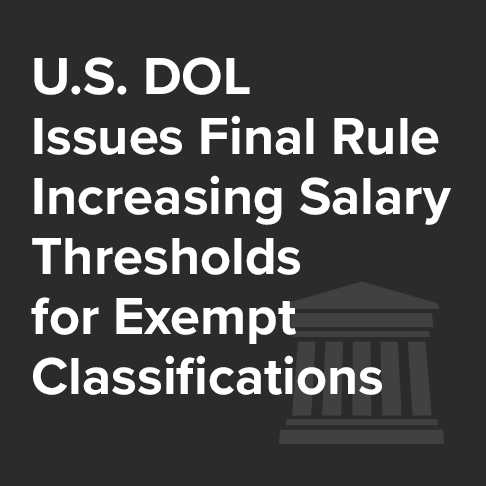United States Department of Labor Issues Final Federal Rule Increasing Salary Thresholds for Executive-Administrative-Professional Classifications

On April 23, 2024, the United States Department of Labor (DOL) announced its final overtime rule which significantly increases the minimum salary under federal law required for salaried exempt status treatment of executive, administrative and professional (including artistic) (together, EAP) employees.
The current salary basis threshold for EAP exempt status is $684 a week or $35,568 per year and the total compensation required to qualify for exemption under the test for highly compensated employees (easier EAP exempt duties test than the basic lower salaried EAP exemptions) is $107,432 per year. Under the new rule, the salary threshold requirements will increase as follows:
- Effective July 1, 2024, the salary basis threshold will increase to $844 a week or $43,888 per year and on January 1, 2025, will increase again to $1,128 a week or $58,656 per year. The 2025 update is aligned with the 35th percentile of weekly earnings of full-time salaried workers in the lowest-wage U.S. Census region.
- Effective July 1, 2024, the salary threshold for the highly compensated employee exemption will increase to $132,964 per year and on January 1, 2025, will increase again to $151,164 per year. The 2025 update is aligned with the 85th percentile of full-time salaried workers nationally.
- The salary thresholds will be subject to automatic increases every three years to maintain alignment with the above earnings percentiles. The next increase is slated for July 1, 2027.
Challenges to the new rule are likely, but if it withstands these, the federal regulations will be more protective than some existing state and local laws. This change is expected to affect approximately four million workers by significantly increasing the number of employees classified as non-exempt, particularly in specific lower pay regions, and will expand the range of job positions eligible for federal overtime pay.
Notably, the DOL’s proposed regulations released in Fall 2023 regarding exempt salary increases included an increase to the special minimum daily rate for exempt employees in the motion picture production industry which are an exception to the general requirement of a minimum weekly salary. If adopted, the proposed federal daily minimum for those employers choosing to pay a daily rate instead of a standard weekly minimum salary to their exempt employees would have exceeded the daily equivalent in even the highest minimum salary states (e.g., California and New York). The final rule, however, abandoned the increase to the special salary levels for the motion picture production industry for now. The DOL indicated that it will address this aspect of the proposal in a future final rule. Based on that, we can expect to see an increase to the federal special minimum daily rate exempt levels in the future. For now, the special federal minimum for salaried-by-the-day employees in the motion picture production industry remains the same at $178.83/day (1/6 of $1,043 special minimum base).
For any questions about this Alert, you may contact:
Robyn Coltin, Director, Employment Law & Litigation Counsel | rcoltin@ep.com
Scott Bishop, Vice President, Employment Law | sbishop@ep.com